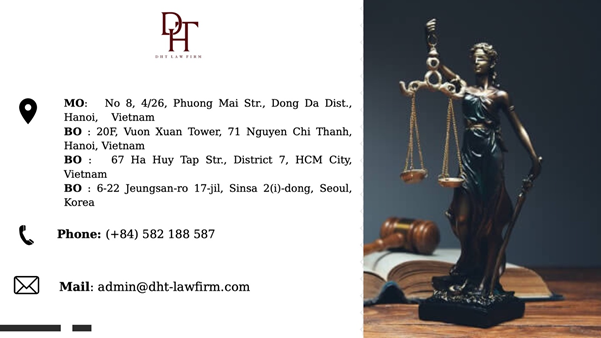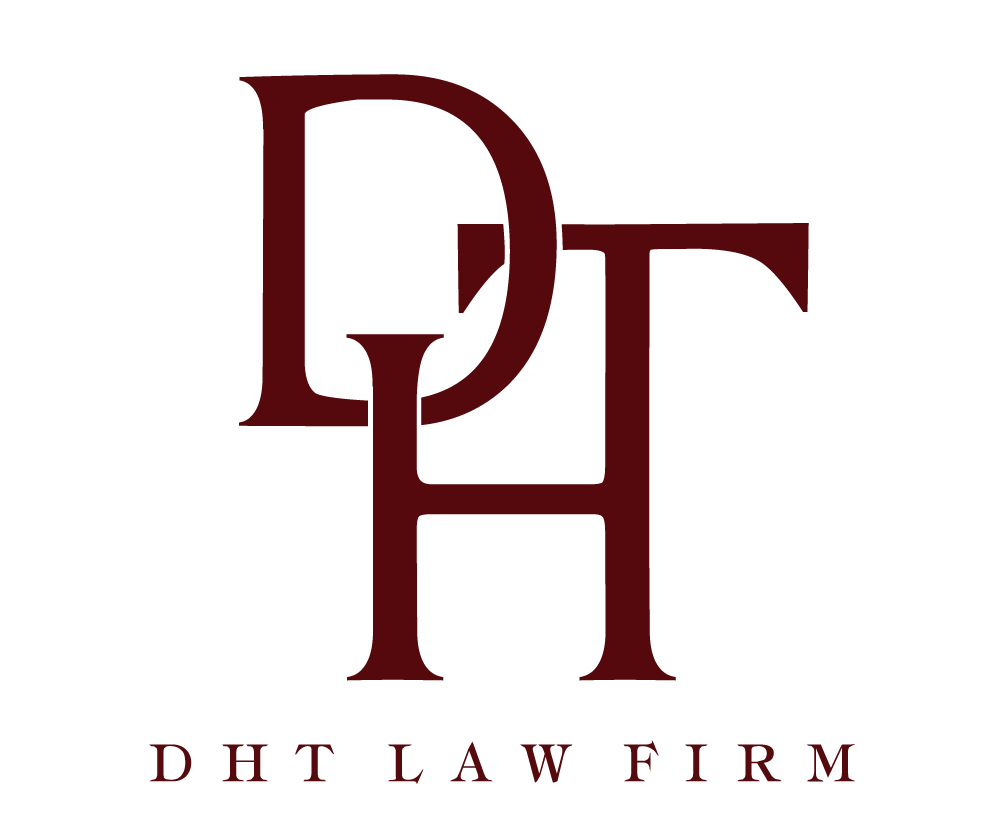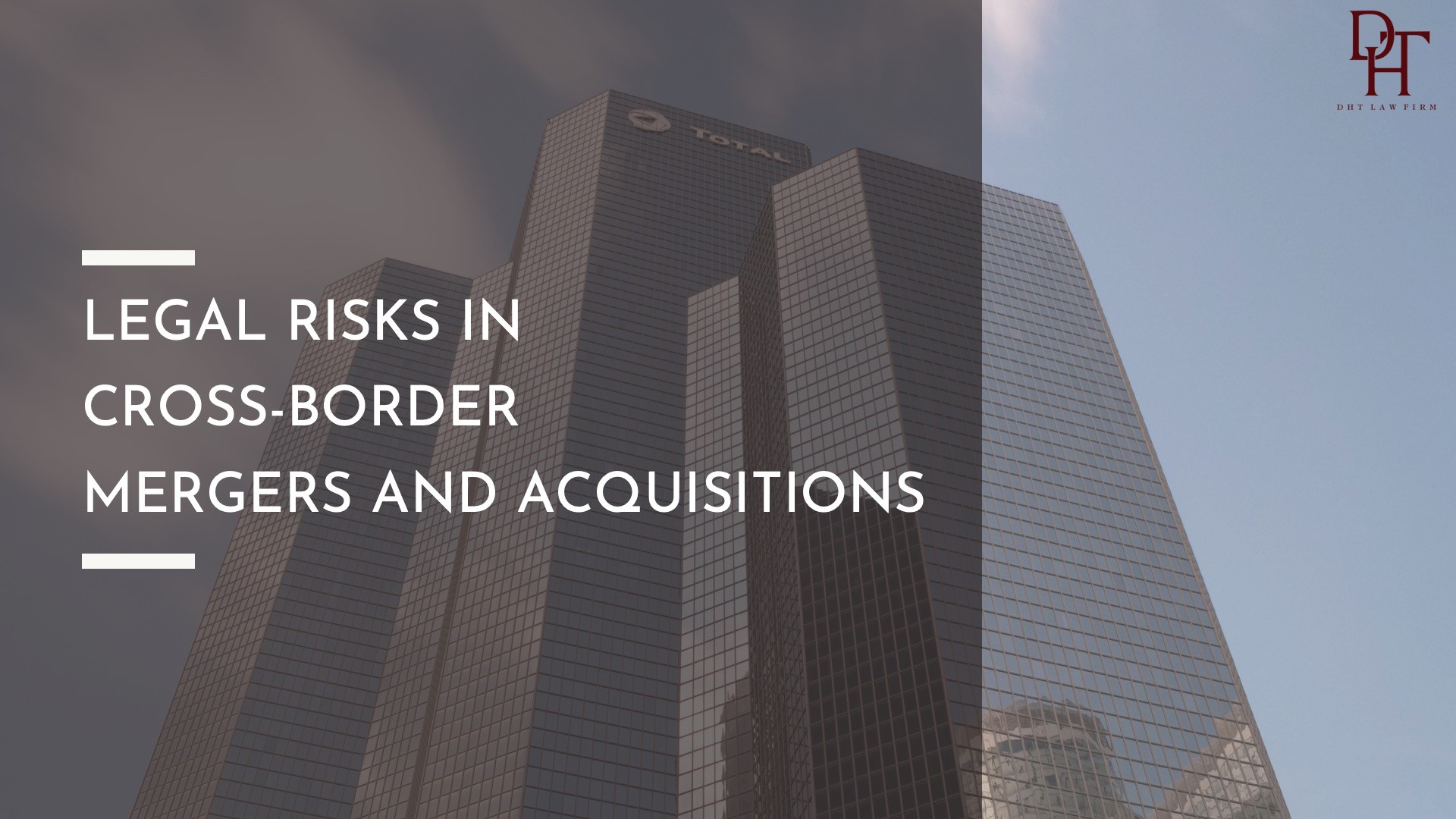
LEGAL RISKS IN CROSS-BORDER MERGERS AND ACQUISITIONS
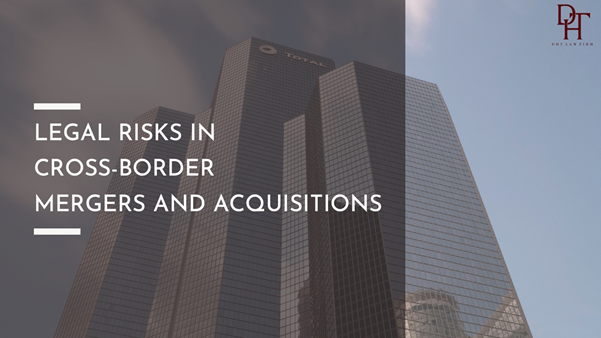
With the topic of mergers and acquisitions, in the previous article, we briefly introduced the operation and legal provisions on M&A in Vietnam. In this section, we focus on cross-border mergers and acquisitions and legal risks to be aware of in the process of carrying out this procedure.
1. Overview on cross-border mergers and acquisitions
In fact, when businesses expand their overseas investment activities, they will either conduct cross-border mergers and acquisitions (cross-border M&A) or foreign direct investment (FDI). Basically, cross-border M&A is a form of M&A in general, generally understood as the M&A between two or more enterprises in different countries.
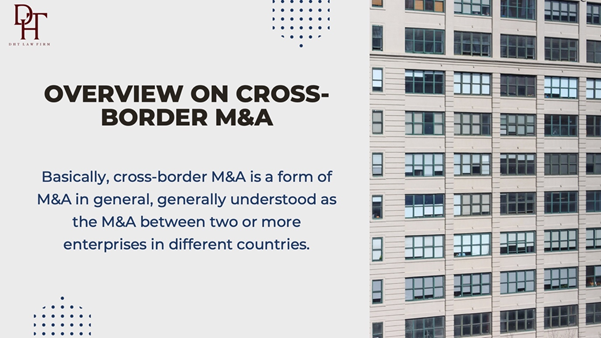
Specifically, cross-border acquisition is a transaction between the acquiring foreign enterprise and the acquired domestic enterprise. Accordingly, an enterprise purchases all or part of the assets of another enterprise, resulting in the acquiring enterprise having the ability to control and dominate all or part of the business activities of the acquired enterprise; simultaneously inherit the lawful rights, obligations and interests corresponding to the purchase of all or part of the assets of the acquired enterprise. Buying and selling businesses can be buying and selling "capital" (buying and selling shares or contributed capital) or buying and selling "assets" of the business.
Meanwhile, cross-border merger is a transaction between the merging enterprise and the merged enterprise of different nationalities, whereby one or several enterprises transfer all assets, rights, their obligations and legitimate interests to another enterprise and terminate the existence of the merged enterprise. The merged enterprise will inherit the lawful rights and interests, and simultaneously be responsible for the obligations and commitments of the merged enterprise. Because mergers and acquisitions are more complex in nature, businesses often conduct business acquisitions. At that time, they will have more favorable and flexible conditions to "restructure" the acquired business.
In general, compared to domestic M&A activities, cross-border M&A has the following distinctive characteristics:
● Cross-border M&A transactions usually involve at least one foreign enterprise for the other parties, unlike domestic M&A transactions that take place entirely between domestic enterprises.
● The transfer of ownership of assets with foreign elements from the purchased/merged party to the purchaser. Accordingly, enterprises do not simply purchase, sell part or all of the assets of the target enterprise; purchase, sell, or transfer part or all of the contributed capital or shares of the target enterprise owner. The influence of the legal regulations governing this activity is set at a higher level, more binding such as issues of sublicense, labor issues, taxes...
● Therefore, the law governing cross-border M&A relations is not only encapsulated in a national legal system, but may be governed or influenced by the legal systems of other countries and related international laws. In a cross-border M&A deal, enterprises do not only consider conditions such as the subject, limit on share ownership rate, capital contribution, market share ownership rate, etc like domestic M&A, but also should note about market access according to commitments between countries, on ensuring the investment environment, protecting national security values, the community.
It can be said that through M&A activities, it is easier for foreign investors to overcome barriers to entry into the industry, or the legal policies of countries when investing in a new market.
2. Some risks to be aware of in the process of cross-border M&A
As mentioned in our previous article, an M&A process can be summarized in 5 stages: Market research; Evaluate and select potential target companies and make proposals; Appraisal process; Negotiate and sign contracts; End of M&A. And precisely because it is a complex process, in each stage there are different difficulties and risks that investors may encounter in the implementation process.
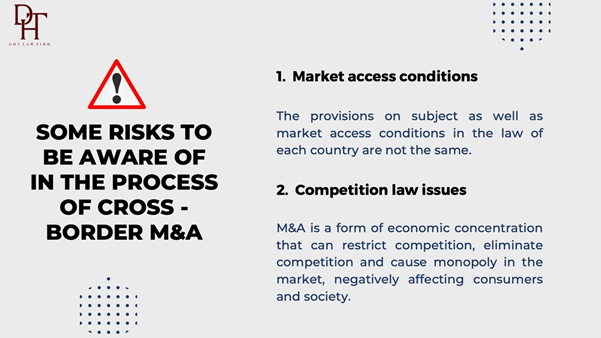
2.1. Market access conditions
Market access conditions are one of the factors investors need to pay special attention to during the market research phase. The reason is because the provisions on subject as well as market access conditions in the law of each country are not the same. The laws of each country set certain criteria to identify foreign investors in M&A transactions or restrictions on investment industries, capital, and value of shares allowed to own in the purchase transaction. In addition, due to the inconsistency in legal regulations, the competent authority may impose a subjective will when determining the status of an entity participating in corporate M&A transactions, accordingly, the respective investment conditions and restrictions apply.
Particularly in Vietnam, market access conditions for foreign investors are conditions that foreign investors must meet in order to invest in the list of business lines with restricted access specified in Clause 2, Article 9 of the Law on Investment 2020. Regulations on conditions for foreign investors to access the market in this Article are made in an opt-out approach. Accordingly, market access conditions as prescribed for domestic investors are applied for foreign investors, except for cases where the investment field falls under: (i) business lines not yet allowed in the market; (ii) business lines allowed in the market with conditions. (issued in Decree 31/2021-ND-CP). In addition, the conditions on the amount of foreign capital, the form of commercial presence also need to be carefully considered to avoid cumbersome procedures and unnecessary consequences.
2.2. Competition law issues
Regarding competition law, investors should pay attention to the provisions of Vietnamese law on forms of economic concentration (including consolidation, merger, acquisition, joint venture and others). Theoretically, M&A is a form of economic concentration that can restrict competition, eliminate competition and cause monopoly in the market, negatively affecting consumers and society. Each country has its own regulations for enterprises participating in economic concentration that possess a combined market share of a certain limit corresponding to certain obligations; at the same time, prohibiting the practice of economic concentration in which the combined market share of participating enterprises is within a limit which is deemed "contrary to the principle of fair competition in the market". This is because in many practical cases, M&A has the ability to reduce competition in the market when the post-merger enterprises have a dominant position in the market. M&A activities can also create an unfair playing field for small businesses, through M&A large companies, multinational companies can easily manipulate a certain market, leading to monopoly. Especially, stock manipulation will become a concern for low-equity enterprises.
Thus, the risks to be aware of related to the aspect of competition law include determining the market scale (based on many factors, including the relevant geographical market and the related product market) and whether a foreign enterprise's market share is obtained through a domestic distributor when determining the relevant market.
2.3. Financial issues
This is a risk that parties need to pay special attention to when it comes to the appraisal stage, these risks may relate to capital contribution. For example, the enterprise has not contributed enough capital, the source of business capital is not transparent, the risk of assets includes valuing assets that are not true to their actual value, risks in debts to state agencies and partners. Normally, in order to check and review financial related contents, the buyer will hire independent audit units to review financial risks. And for assets, the buyer will hire an appraiser to determine the enterprise value.
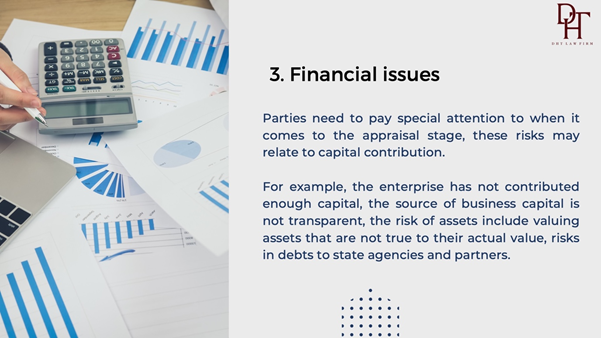
There may be cases of M&A transactions for the purpose of money laundering from foreign investors or other purposes or M&A transactions to conceal another transaction... These transactions are at risk of having their investment certificates withdrawn if transparency cannot be demonstrated. Before this risk, the selling company may request the buyer to provide necessary documents to check that the financial capacity of the buyer is sufficient to ensure the fulfillment of payment obligations in the merger or acquisition transaction between two parties.
3. Some measures to limit legal risks in cross-border mergers and acquisitions
Before participating in an M&A, enterprises need to investigate the intended investment field of the foreign investor performing the M&A, then review the specialized laws, thereby rationally setting the rate of capital contribution.
The second measure is to expertise detailed legal due related to economic concentration control issues under competition law. Enterprises must determine their market share and estimate the combined market share if conducting M&A and especially actively self-assess the size of their business and the target business. In addition, based on the criteria set by the law to consider the economic concentration group to be controlled, enterprises should pay attention to make the announcement of economic concentration as prescribed, including: (i) Total assets on the Vietnamese market of enterprises participating in the economic concentration; (ii) Total revenue on the Vietnamese market of enterprises participating in the economic concentration; (iii) Transaction value of the economic concentration; (iv) Combined market share in the relevant market of enterprises participating in the economic concentration.
The third measure is to evaluate the legal status of the parties to the transaction. In an M&A transaction, this is an important step to create a basis for drawing conclusions about the legitimacy of the legal rights and obligations of the target enterprise. Accordingly, enterprises need to determine the internal legal relationships of shareholders, members of the enterprise, property owners, legal regimes for different types of assets, project documents, and land use rights, contracts, investment cooperation agreements, contracts for employees ... from there, there are solutions to limit risks and make appropriate M&A decisions.
And the last is to review, adjust and draft in writing all significant agreements. Due to the complex nature of M&A activities and the international element of cross-border M&A, businesses need to pay attention to the form of contracts between the parties in order to have a clear legal basis as well as to facilitate transactions. future dispute resolution. Important contracts to consider are property purchase contracts, credit contracts, bank loan commitments, mortgages, company property guarantees, labor contracts, and collective bargaining agreements. At the same time, drafting detailed contracts in M&A transactions such as exclusive and confidentiality agreements, M&A contracts (Business purchase and sale contract, asset purchase and sale contract, sale/transfer contract, shares/capital contribution, etc)
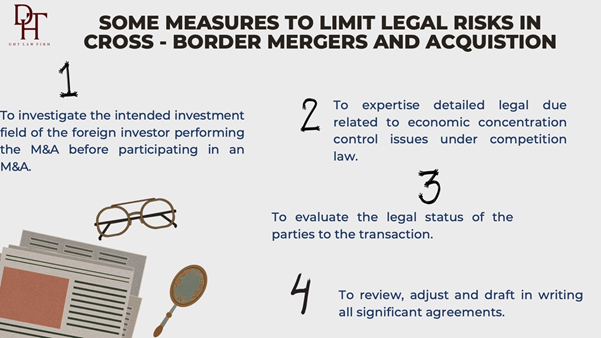
Consulting services on mergers and acquisitions provided by Dai Ha Thanh Law Firm:
● Consulting process, procedures for mergers and acquisitions
● Researching legal regulations on market access conditions, capital requirements, business lines,...
● Appraisal of legal documents related to business, labor and financial matters
● Drafting, editing, reviewing dossiers, contracts and related documents; Assist in evaluating contract terms to ensure benefits for customers
● Support in the implementation of legal procedures during the implementation process
● Exchange and provide information to customers about investment activities through mergers and acquisitions.
Please liaise with us to receive professional and effective legal advice if you have any questions or problems.
